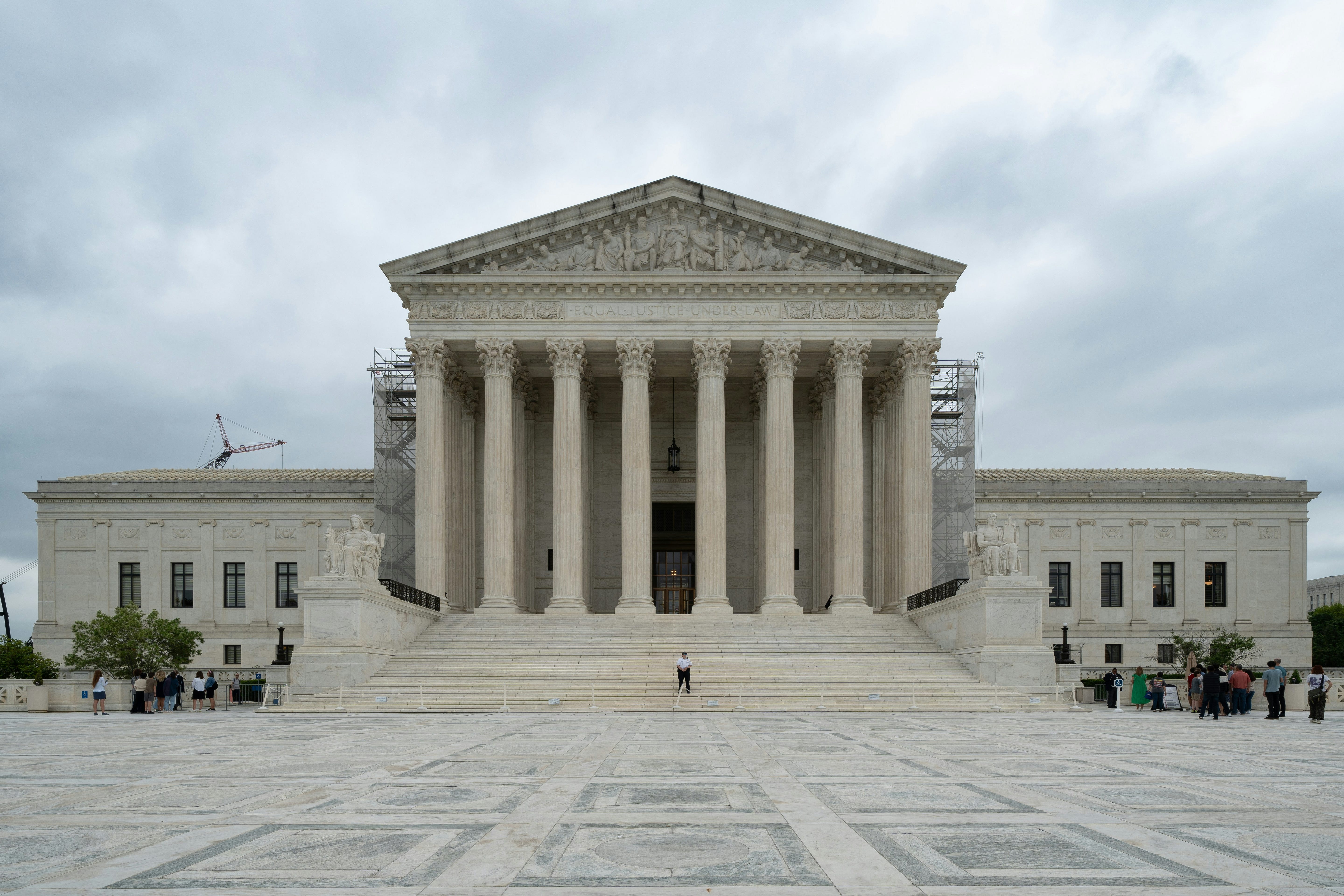Biden to embrace Supreme Court reforms activists have long lobbied for
The three proposals are unlikely to gain congressional traction, but the president’s bully pulpit can keep them in the public discourse through the remaining six month of his term.
President Joe Biden will call for three major Supreme Court reforms this afternoon during remarks in Austin where he will frame the issue as a legislative priority for the final six months of his presidency.
Biden, a former chair and ranking member of the Senate Judiciary Committee, will recommend term limits for justices, a binding code of ethics for the court and a constitutional amendment to ban immunity for crimes a former president committed in office.
“The nation was founded on a simple yet profound principle: No one is above the law,” Biden wrote in an op-ed that posted this morning. “Not the president of the United States. Not a justice on the Supreme Court of the United States. No one.”
In his speech at the LBJ Presidential Library to commemorate the 60th anniversary of the Civil Rights Act, Biden will argue that the reforms will restore trust and accountability to the highest court of the land.
Specifically, the constitutional amendment would clarify that no president is protected from federal criminal indictment, trial, conviction or sentencing due to their office—a direct about-face of a recent Supreme Court decision shielding former President Donald Trump from charges stemming from his role in inciting the January 6th insurrection on the Capitol.
Biden will contend that appointing a justice every two years to an 18-year term would ensure regular changes in Court membership, make nomination timing more predictable, and reduce the long-term influence of any single presidency.
And the conduct and ethics rules he’ll advocate for would require the disclosure of gifts, avoidance of public political activity, and recusal from cases with financial or other conflicts of interest.
“I have overseen more Supreme Court nominations as senator, vice president and president than anyone living today. I have great respect for our institutions and separation of powers,” Biden said in the op-ed. “What is happening now is not normal, and it undermines the public’s confidence in the court’s decisions, including those impacting personal freedoms. We now stand in a breach.”
But a two-thirds vote of the House and the Senate is required to propose an amendment and ratification from three-fourths of states. And the two reforms would require a House majority, at least 60 votes in the Senate and a Democratic president to sign them into law.
And although the White House says President Biden and Vice President Kamala Harris look forward to working with Congress to formalize these recommendations, the House skipped town a day early last week for a six-week recess. The Senate will gavel out for the rest of the summer on Thursday. And when Congress returns in September, it will be singularly focused on passing a short term funding extension by the end of the month. Members will be home in their districts and states campaigning all of October. And there will likely be no movement on the issue in the lame-duck session between Election Day and the presidential inauguration.
However, Biden's call for reforms shows just how much judicial reform activists have shifted the discourse on the issue.
President Biden first publicly teased his announcement in a letter to congressional Democrats three weeks ago pushing back against a campaign to force him to end his reelection bid after a poor first debate against Trump 11 days earlier. (He referenced the issue last Thursday in an Oval Office address explaining his decision to pass the torch to Vice President Harris.)
“We are the ones who bring real Supreme Court reform,” Biden wrote in the letter. “Donald Trump and his majority want more of the same from the Court, and the chance to add to the right-wing majority they built by subverting the norms and principles of the nomination and confirmation process.”
Biden, of course, is referring to Senate Minority Leader Mitch McConnell (R-Ky.)’s 2016 blockade of then-federal Judge Merrick Garland’s nomination to the Supreme Court by President Barack Obama based on its proximity to the presidential election 10 months later. McConnell oversaw the confirmation of Justice Amy Coney Barrett’s nomination to the high court just over one month before the 2020 election.
Coney Barrett was the third judicial shoe to drop during the Trump administration to secure a conservative supermajority that has wreaked havoc on the nation and Biden’s legacy.
In 2022, the Supreme Court overturned Roe v. Wade, which guaranteed the national right to abortion care and unleashed a flurry of statewide bans on the procedure. The next summer, the six conservatives blocked Biden’s plan to cancel up to $20,000 in student loan debt and banned race-based admissions in higher education. And just a few weeks ago, the court struck down the Chevron doctrine—a 1984 precedent that required federal courts to defer to a federal agency’s interpretation of an unambiguous or unclear statute—in addition to the Trump immunity case.
A little under three months after Biden took office, he issued an executive order that established a 35-member presidential commission to investigate Supreme Court reform and issue a report within 180 days of its first meeting the following month.
The 300-page final report featured findings on the commission’s review of several legal questions about the court but no major recommendations to change its operation.
Momentum for reform picked up steam again last April when ProPublica, a New York City-based nonprofit investigative journalism newsroom, published a series of reports that Justice Clarence Thomas accepted undisclosed luxury trips from Harlan Crow—a billionaire real estate investor who also bought and renovated a house where Thomas’s mother lives and paid the private school tuition of the justice’s grandnephew.
Months later, ProPublica reported that Justice Samuel Alito also took undisclosed luxury trips he didn’t pay for. Weeks ago, The New York Times published a report revealing an upside-down flag outside his Virginia home representing a symbol of the so-called “Stop the Steal” movement that led to the Capitol insurrection in 2021. The Times followed up its reporting with another revelation that a flag associated with insurrectionists was flown outside Alito’s New Jersey residence last summer.
Congressional Democrats at the member and committee level have denounced Thomas and Alito’s behavior and Chief Justice John Roberts’s unwillingness to install meaningful reforms on his own.
“Part of the problem that we confront is that the Supreme Court has chosen to conduct itself as if the judiciary is above the law,” House Minority Leader Hakeem Jeffries (D-N.Y.) told reporters in May. “In America, no one is above the law. That includes the Supreme Court, that includes Samuel Alito and that includes Clarence Thomas.”
House Democratic Caucus Chair Pete Aguilar (Calif.) added earlier this month: “It is incredibly clear that it is a runaway Supreme Court that does not feel that they have a check.
Rep. Hank Johnson (Ga.), the top Democrat on the House Judiciary Subcommittee on the Courts, launched a task force in May to reinforce the constitutional checks through legislation to enforce term limits and a code of ethics plus court expansion from nine justices to 13—a reform excluded from President Biden’s proposals.
“Not everyone in Congress knows this is a five-alarm situation. We need to educate other members and congressional staffers about how we got here, what the scope of the problem is, and what steps we can take to save our democracy,” Johnson said when he launched the task force. “To fix a problem you have to demystify it. And that’s what we hope to do.”
It should come as no surprise that Hill Republicans don’t think there’s a problem. GOP lawmakers accuse Democrats’ calls for reforms as sour grapes—disdain for an institution that is simply interpreting the laws as they’re written.
Mitch McConnell has adopted a hands-off approach to the high court after marshaling the conservative movement’s takeover of the federal judiciary.
“It seems to me there are just nonstop attacks on the Supreme Court week after week after week,” McConnell said in May. “We need to leave the Supreme Court alone, protect them from people who went into their neighborhoods and tried to do them harm and look out for the Supreme Court—that’s part of the job of the [Biden] administration.”
But Senate Majority Leader Chuck Schumer (D-N.Y.) claims the Roberts court has disincentivized Republicans from leveraging the legislative process and encouraged them to look to the courts to impose its agenda through a practice known as judge shopping, in which conservative ideologues across the country pick and choose judges they know will be sympathetic to their cause.
Democrats say judge shopping explains how a single district court judge in the Texas panhandle blocked a Biden administration rule on gun background checks from taking effect earlier this year and suspended the FDA’s approval of medication abortion before the Supreme Court unanimously restored access to the drug based on a technicality.
“Judge shopping jaundices our legal system like few other abuses do. Picking and choosing a judge to get a predetermined outcome is the definition of unfairness and Congress should fix this abuse with appropriate legislation,” Schumer said in May. “Even the Chief Justice of the Supreme Court—hardly a liberal—has acknowledged that judge shopping is a problem that ought to be addressed.”
Democrats also point to the data to prove public opinion on the Supreme Court reform is on their side.
56 percent of all adults disapprove of the Supreme Court, according to averages compiled by the polling website FiveThirtyEight. Approval has fallen to 39 percent as of May—before the Chevron and immunity decisions—according to the most recent Marquette Law School national poll from May, which represent sent the lowest approval numbers 2020. (Almost 60 percent of Republicans approve of the Supreme Court, but Democrats and independent voters plummet the percentage with their 25-percent average. This is also around the average percentage of Americans who say they have confidence in the court.)
Much of the disapproval is rooted in the belief among 56 percent of Americans that the Supreme Court justices’ decisions are motivated by politics and driven by at least a somewhat conservative ideology (57 percent).
House Democrats had their sights on federal judicial reforms weeks ago President Biden reinvigorated the party’s prospects of winning back the chamber by stepping aside and endorsing Vice President Harris’s candidacy.
“They are not guided by the ethics standards that other judges are. I think we can start there. That has been a discussion on both sides of Capitol dome. Let’s start there,” Aguilar said. “And if there are other reforms that are worthy of consideration, we should debate them as we debate a variety of issues when it comes to keeping government safe and ensuring that we have a functioning democracy.”
Vice Chair Ted Lieu (D-Calif.) said a Democratic Congress would prioritize restoring the Chevron doctrine.
“The Supreme Court has now essentially said that, ‘Hey, judges are better than the technical experts and agencies in looking at congressional statutes,’” Lieu said. “No, judges are not better than technical experts at federal agencies. Who do these justices think they are? Do they really know biology and science and chemistry and all the things that experts need to know? No, they do not. This is a power grab for the conservative Supreme Court. And we’re going to fix that if we flip the House, hold the Senate and we keep Donald Trump out of the White House.”
Meanwhile, Jeffries has indicated his members won’t waste time reining in the justices once the gavels are back in their hands.
“At minimum in our system of checks and balances, with separate and coequal branches of government, it is Congress’s responsibility to engage in responsible oversight over the judicial branch,” he said. “And I certainly think that the first opportunity we have to do just that. We will not shy away from oversight, but we will engage in it.”



